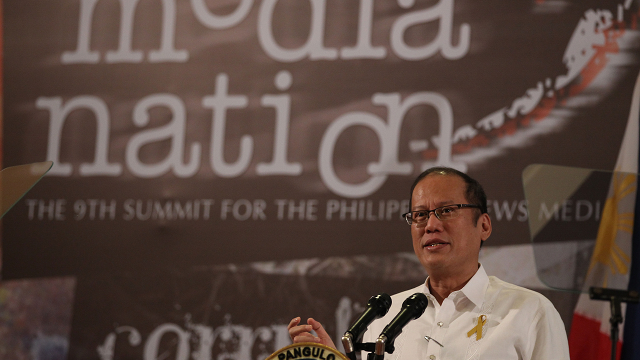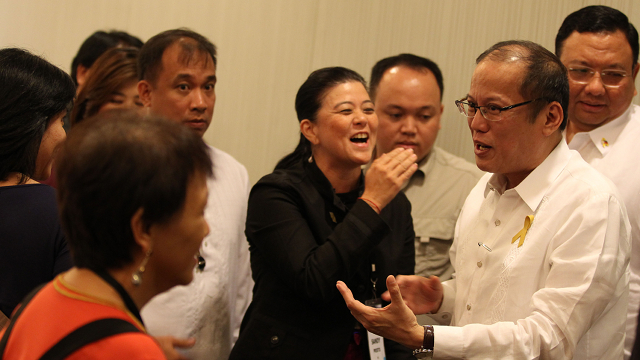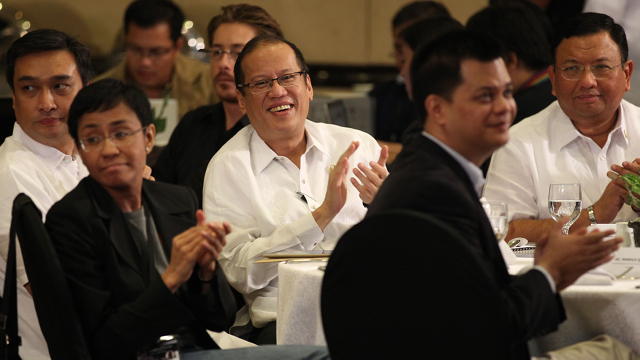SUMMARY
This is AI generated summarization, which may have errors. For context, always refer to the full article.

TAGAYTAY CITY, Philippines – It all comes down to conflict of interest.
This is how President Benigno Aquino III summed up media corruption as he called on journalists to improve their standards and clean up the industry.
A media critic, Aquino faced media executives and journalists as he addressed the MediaNation9 summit on Friday, November 23, at the Taal Vista Hotel in Tagaytay. November 23 is the 3rd anniversary of the Maguindanao massacre that killed 58 people, mostly reporters and media workers.
The President stressed the need for media practitioners to establish consistent standards, and address corruption in their ranks. Read the full speech here. Watch here:
“At the heart of skepticism or even hostility lies the question of conflicts of interest. There are many questions left unanswered. For instance, what are the parameters concerning endorsements? What are the requirements for sources? What are the mechanisms for redress? Citizens can go to the Ombudsman when it comes to public officials. Who can Juan dela Cruz run to in your industry?”
“The lack of standards … [makes] it easier for corruption to take place,” Aquino said.
Aquino said the government is acting on pressing concerns of journalists.
“In cases of media killings, for example, we in government are demanding the apprehension of suspects and the filing of charges that stick, resulting in justice for all involved. In other cases of violence involving media, we have taken affirmative and just action.”
Like in his past speeches, Aquino was candid in his evaluation of the media but used a more conciliatory tone. He said the government and the media must work together to address corruption.
“My door is always open, and I am here to listen to you and to work with you. I have said nothing that your own readers, viewers and listeners have not already said themselves. I hope you view my presence here not as that of a President, but as of someone who has read your newspapers and watched your shows long before being elected into this position, and will continue to do so after I step down.”
He joked, “I came from the ASEAN summit where I endeavored to be my most diplomatic self. I think I can be more diplomatic with my countrymen.”
Following his speech, Aquino had a rare closed-door session with the participants. It’s the first time for a Philippine president to speak at a Media Nation forum, according to organizers.

Salaries, opinion and reportage
Aquino said the media needs to draw the line to establish consistent standards on various issues. He drew parallelisms between corruption in media and in government.
The President said a factor in fighting corruption was ensuring that reporters get adequate income.
“Given the hard work they do and the high standards everyone should demand of them, it becomes legitimate to ask if their pay is commensurate to highest standards of integrity demanded of them. That’s no different from the concerns the government and the private sector must bear in mind for all employees.”
Aquino said journalists also need to improve standards on the type of content they produce.
“It falls upon you to enlighten the public further on the difference between opinion and reportage. This is already a topic of debate. This gives you an added impetus to settle the issue once and for all.”

Libel, right of reply, Twitter
Aquino also said journalists must come up with a grievance mechanism for their audience. He urged them to be open to debates on issues like legislative measures on the right of reply and libel.
“Basic fairness should suggest that these proposals are not motivated merely by hostility to media, but that there may be cases where people are genuinely and justifiably aggrieved. Instead of shutting the door, let us engage in respectful dialogue.”
The President again stressed that while he is in favor of decriminalizing libel, Internet users must still be held responsible.
“The decriminalization of libel should not be a license to commit it,” the President said.
Aquino recently drew flak for signing the Cybercrime Prevention Act into law, which imposes a higher penalty on online libel instead of supporting efforts to decriminalize libel.
Despite an earlier promise, the President has also not pushed for the approval of the Freedom of Information Act, which mandates government agencies to make documents and transactions more accessible to the public.
He chose to skip these two issues in his speech.
Aquino also acknowledged the rise of social media as a new challenge for journalists.
“The very standards that have allowed media to be considered the fourth estate—vetting facts, objectivity in reportage, and speaking truth to power—are all challenged by the need to break the story first. Success or failure is measured in milliseconds. Where you must be the first to tweet or post online.”
Despite his comments, Aquino stressed that he does not see regulation as the answer to the media’s problems.
“This is not a pitch for government to take an active role in media regulation. I have seen the harmful effects of state-controlled media [during Martial Law.”
Prieto: Diversity at heart of democracy
Aquino has scored what he called inaccurate and misleading news reports, including that of a supposed date last March.
In July, he took a swipe at former Vice President and ABS-CBN anchor Noli de Castro for alleged baseless speculation and commentaries against the administration despite his own stint in government.
In her remarks at the Media Nation summit, Philippine Daily Inquirer’s Alexandra Prieto-Romualdez responded to Aquino’s criticism of negativity in the media.
“We feel for you. The President is burdened enough without the added weight of negative news [but] the Constitution allows the press to define negative or positive in different ways. This diversity of opinion is at the heart of democracy,” Prieto-Romualdez said.
She added, “All news orgs have their own encounters with negativity. Like you I’m sure you often wanted to challenge someone and say, ‘Sige nga kayo nga ang gumawa nito.’” (Go ahead, you do the job.)
The remark drew laughter from the President. – Rappler.com
Add a comment
How does this make you feel?
There are no comments yet. Add your comment to start the conversation.